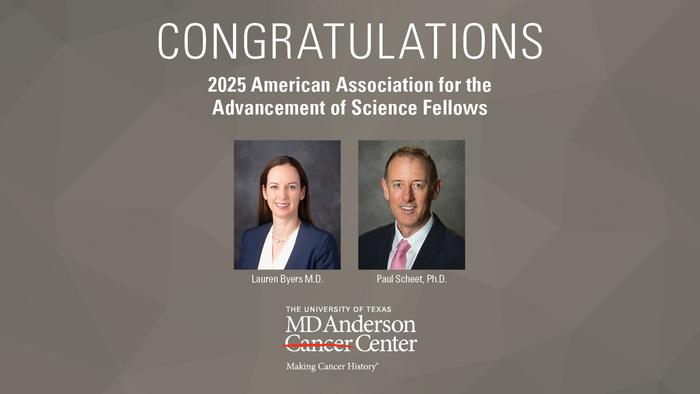HOUSTON — Marking a significant milestone in the field of cancer research, two distinguished members of The University of Texas MD Anderson Cancer Center, Lauren Byers, M.D., and Paul Scheet, Ph.D., have been elected as fellows of the prestigious American Association for the Advancement of Science (AAAS). This esteemed honor represents one of the pinnacle achievements within the scientific community, bestowed upon individuals whose contributions have profoundly shaped their respective fields. The tradition of electing fellows by peer recognition dates back to 1874, underscoring the long-standing significance of this accolade.
This year, a total of 471 scientists, engineers, and innovators spanning all 24 of AAAS’s disciplinary sections have been recognized for their outstanding contributions to science and societal advancement. Among this elite group are Byers and Scheet, highlighting the remarkable achievements of MD Anderson, which has seen 70 of its faculty members celebrated as AAAS Fellows to date. This acknowledgment not only honors individual accomplishments but also illustrates the institution’s commitment to advancing cancer research and care through innovative scientific inquiry.
Dr. Lauren Byers, a highly respected professor in the Department of Thoracic/Head and Neck Medical Oncology, has been recognized for her pioneering work in small cell lung cancer (SCLC) research. Internationally acknowledged as an expert in this challenging area, Byers has played a transformative role in the development of novel drug classes that offer new avenues for personalized treatments. Her groundbreaking contributions have established the first standardized molecular classification for SCLC, which is now widely utilized in clinical trials and practice.
Byers’ research has far-reaching implications for patients battling lung cancer, particularly as it addresses critical issues such as therapeutic resistance and intratumor heterogeneity. By revealing the complexities behind why SCLC tumors often develop resistance to traditional chemotherapy, her work helps ensure that patients receive the most effective forms of treatment available. Currently, she leads several research programs that bridge the gap between laboratory discoveries and clinical application, serving as co-principal investigator for the National Institutes of Health/National Cancer Institute’s SCLC Consortium Coordinating Center.
In parallel, Dr. Paul Scheet, who chairs the Department of Epidemiology, has made significant strides in the realms of genetic epidemiology and cancer genomics. His innovative methods have helped scientists detect mosaic chromosomal changes in normal tissues and early-stage lesions—issues that had previously been overlooked due to the scarcity of mutant cells. Scheet’s research is not only redefining how we understand cancer risk but is also elucidating the biological nuances of pre-malignant states.
Beyond his extensive research contributions, Scheet is recognized as an inspiring mentor and educator. His dedication to guiding the next generation of scientists is evidenced by his involvement in leadership roles, including serving as the chair of the Population Sciences Working Group at the American Association for Cancer Research. His efforts ensure that future researchers are equipped with the knowledge and skills necessary to continue the fight against cancer.
The recognition of Byers and Scheet as AAAS Fellows reflects the commitment of MD Anderson to advance discoveries that not only improve patient outcomes but also elevate the standards of research excellence. Peter WT Pisters, M.D., the president of MD Anderson, has praised their exceptional leadership and persistent commitment to enhancing cancer care, emphasizing that their achievements are a source of pride for the institution.
MD Anderson fosters a unique research environment characterized by collaboration and the free exchange of ideas between clinicians and scientists. This synergy accelerates the transition of laboratory discoveries into actionable clinical solutions, allowing innovations to swiftly reach the patients who need them most. Such a dynamic interplay between lab and clinic empowers researchers to adapt their inquiries in response to clinical realities, fostering a culture of agility and responsiveness in cancer research.
The journey of scientific discovery is rarely linear; it is often marked by a cycle of investigation, application, and refinement. Research findings in one domain can illuminate pathways in another. For instance, ongoing studies in lung cancer may spur advancements in treatment protocols that can be applied to other malignancies, showcasing the interconnected nature of medical research. The work being done by Byers and Scheet exemplifies this collaborative spirit, as their research not only addresses specific cancer types but contributes to the broader knowledge of cancer biology.
As the landscape of cancer treatment continues to evolve, the role of researchers like Byers and Scheet becomes increasingly critical. Their contributions help form the bedrock upon which future advancements can be built, enhancing the arsenal of tools available to oncologists worldwide. They embody the spirit of inquiry and perseverance that fuels scientific progress and the quest to improve patient outcomes.
Moreover, the significance of this recognition extends beyond individual achievements; it reflects a collective commitment within the scientific community to confront the complexities of cancer. The honors bestowed upon researchers like Byers and Scheet reaffirm the importance of rigorous research and collaboration in tackling one of humanity’s most challenging health crises. Such accolades serve to inspire others within the field, galvanizing efforts to push the boundaries of what is possible in cancer research and treatment.
In conclusion, the election of Lauren Byers and Paul Scheet as AAAS Fellows underscores the transformative power of scientific research in advancing both knowledge and patient care in oncology. Their accolades serve as a testament to the collective efforts at MD Anderson, fostering a legacy of excellence that continues to illuminate the path toward more effective cancer treatments.
Subject of Research: Small Cell Lung Cancer and Cancer Genomics
Article Title: MD Anderson Researchers Elected AAAS Fellows for Their Contributions to Cancer Research
News Publication Date: October 16, 2023
Web References: MD Anderson Newsroom
References: AAAS, MD Anderson
Image Credits: Credit: The University of Texas MD Anderson Cancer Center
Keywords: Cancer Research, Small Cell Lung Cancer, AAAS Fellows, MD Anderson, Epidemiology, Genomics, Therapeutic Innovation, Scientific Community




